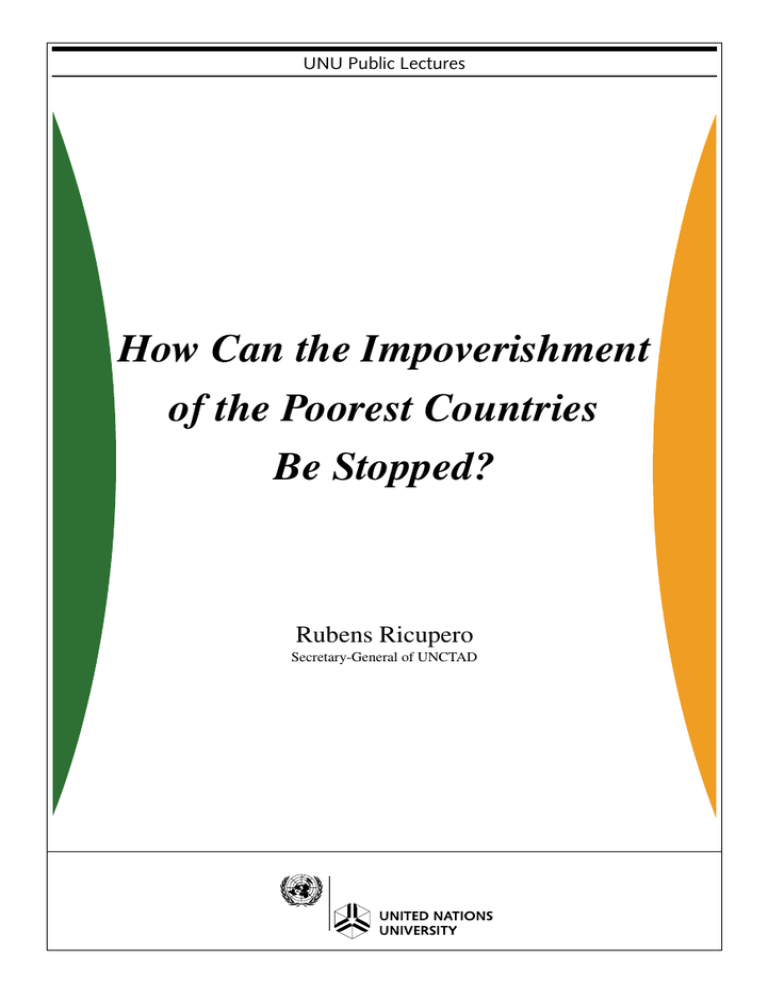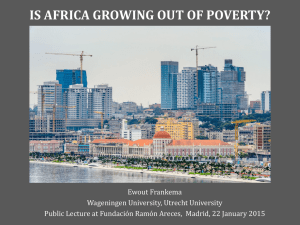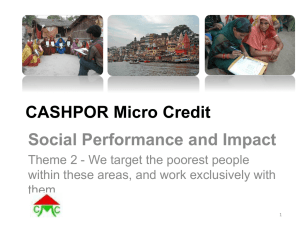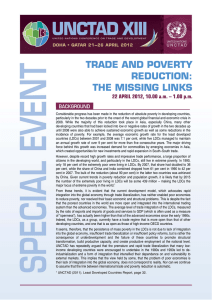How Can the Impoverishment of the Poorest Countries Be Stopped? Rubens Ricupero
advertisement

UNU Public Lectures How Can the Impoverishment of the Poorest Countries Be Stopped? Rubens Ricupero Secretary-General of UNCTAD About the United Nations University The United Nations University is an organ of the United Nations established by the General Assembly in 1972 to be an international community of scholars engaged in research, advanced training, and the dissemination of knowledge related to the pressing global problems of human survival, development and welfare. Its activities focus mainly on peace and conflict resolution, development in a changing world, and science and technology in relation to human welfare. The University operates through a worldwide network of research and postgraduate training centres, with its planning and coordinating headquarters in Tokyo. UNU Public Lectures How Can the Impoverishment of the Poorest Countries Be Stopped? First edition published: Designed and printed by: May 2003 Public Affairs Section The United Nations University 53-70, Jingumae 5-chome, Shibuya-ku Tokyo 150-8925, Japan Telephone: +81(3)3499-2811 Fax: +81(3)3499-2828 E-mail: mbox@hq.unu.edu Website: http://www.unu.edu Omega Communications, Inc. ©The United Nations University, 2003 UNU Public Lectures How Can the Impoverishment of the Poorest Countries Be Stopped? Rubens Ricupero Secretary-General of UNCTAD Tokyo, 26 November 2002 Foreword I am very pleased to introduce this lecture by Mr. Rubens Ricupero, the Secretary-General of the United Nations Conference on Trade and Development (UNCTAD). The theme of Mr. Ricupero’s lecture is one that is frequently discussed in the global news media and in international conferences, such as the International Conference on Financing for Development held in March 2002 in Monterrey, Mexico. Nonetheless, the major powers are more concerned nowadays about security issues, appearing to treat the development of the poorest countries with thoughtless inattention rather than the strong commitment that is needed. There is a real risk, if we focus only on security aspects such as terrorism and international organized crime, that the consideration of justice, equity and international solidarity will lose priority. Yet the roots of insecurity are complex, and among the many causes we see extreme poverty and deprivation as being central; failure to adequately address these vital issues may contribute to the reinforcement of insecurity. Reducing poverty in the poorest countries should, therefore, remain the main objective of both developed and less developed countries. In his address, Mr. Ricupero highlights the fact that not a single least developed country (LDC) has been able to join the World Trade Organization (WTO) in the nearly 10 years that have elapsed since its foundation. This, he observes, is a shared responsibility of both the developed and less developed countries, as well as a real challenge to all of us. As the Secretary-General of the United Nations Conference on Trade and Development, and throughout his career, Rubens Ricupero’s dedicated work has helped to bring the challenges of alleviating poverty to the core of the global political realm; looking for some ways to climb out of the “poverty trap” has remained his constant and main concern. A recent UNCTAD report, issued in September 2002, suggests that future progress in international efforts to alleviate poverty will depend as much on international development cooperation in resolving problems associated with protectionism, aid and debt as on the improvement of domestic policies, institutions and governance in developing countries. Mr. Ricupero sees the recent emphasis on poverty reduction by international financial institutions in Africa (where 34 of the 49 LDCs are located) as 2 grounds for a cautious optimism; the NEPAD initiative, he notes, also signals the preparedness of African leaders to assume their responsibilities in alleviating poverty. What Mr. Ricupero tells us is that, in order to do so, these countries need the support of the international community: it is our role – our shared responsibility and challenge – to support them. Mr. Ricupero was appointed as UNCTAD’s fifth Secretary-General in September 1995 and, on the recommendation of the United Nations Secretary-General, reappointed by the General Assembly for another fouryear term in 1999. Previously, he held various ministerial functions during a long career with the Brazilian Government, and in 1994 became Minister of Finance, in which role he supervised the launching of the Brazilian economic stabilization programme. He also held various diplomatic posts, including Ambassador and Permanent Representative to the United Nations in Geneva (1987–1991), Ambassador to the United States of America (1991–1993) and Ambassador to Italy (1995). At GATT, between 1989 and 1991, he served as Chairman of the GATT Council of Representatives, Chairman of the GATT Contracting Parties, Chairman of the GATT Committee on Trade and Development, and Chairman and Spokesman of the GATT Informal Group of Developing Countries. Mr. Ricupero has also headed the Brazilian delegations to the United Nations Commission on Human Rights and the Conference on Disarmament, both in Geneva, and in 1992 served as Chairman of the Finance Committee at the United Nations Conference on Environment and Development, Rio de Janeiro. He was a Professor of Theory of International Relations at the University of Brasilia from 1979 to 1995 and Professor of History of Brazilian Diplomatic Relations at the Rio Branco Institute from 1980 to 1995. He is the author of several books and essays on international relations, economic development problems, and international trade and diplomatic history. It was a privilege to have Mr. Ricupero at the United Nations University, and certainly his message demands an ever-increasing dedication to pursuing the development of the poorest countries. Hans Van Ginkel Rector The United Nations University 3 How Can the Impoverishment of the Poorest Countries Be Stopped? Rubens Ricupero Secretary-General of the United Nations Conference on Trade and Development (UNCTAD) Tokyo, 26 November 2002 Mr. Chairman, The mere fact that we are gathering here to discuss how to stop the impoverishment of the poorest countries should – and I am sure it does – provoke a certain sense of malaise among all of us. In this globalized world, where production and trade levels have attained unprecedented proportions, where technology can help to meet the food and health needs of the whole population of our planet – in this very world, a number of countries are failing to join the path of economic and social progress. What is even more dramatic, living conditions have been retrogressing in these countries, and destitution has become an all-pervasive social scourge. The international consequences of this plight can hardly be overestimated, as such plight can be a source of undesired migration flows and of propagation of serious diseases. The continuing impoverishment of these countries poses a major challenge, both on political and on ethical grounds, to the international community as a whole, and in particular to those countries which have the means of assisting in reversing this trend. Our conference, therefore, could not have chosen a more appropriate, and burning, issue as a subject of discussion. On this occasion, Mr. Chairman, I would like to share with you my thoughts on what needs to be taken into account and, most of all, done, so as to stop the impoverishment of the poorest countries of the world – namely, the 49 countries classified as least developed countries (LDCs) and, equally important, those of the sub-Saharan region as a whole. 5 6 UNU PUBLIC LECTURES Least developed countries I would like, at the outset, to underline the link which exists between the challenges faced by the least developed countries and the Millennium Development Goals. I strongly believe that we need to establish constant synergies between these goals and the seven Commitments contained in the Programme of Action for LDCs. It should be very clear in our minds that those two sets of objectives are totally compatible, and we have to utilize them as guidelines for our action. All the actors of the international community should remember this, because the central goal is very clear – namely, poverty eradication. This is precisely the background against which we in the UNCTAD secretariat intend to enhance our work on LDCs. We must seek to promote, in both our policy analysis and our technical cooperation activities, a set of actions that converge towards meeting the targets agreed upon by the international community to support the LDCs. We must all engage in a concerted process of translating the ethical imperative of greater solidarity with the weaker countries into tangible benefits. This is, we believe, the indispensable ingredient for fostering principles such as good governance, openness, peace and stability in the poorest countries. We in UNCTAD believe that several lessons can be drawn from our long experience of analytical and technical activities in LDCs over a period of 30 years. One such lesson is that the task of setting these countries on the path of sustained growth is complex. It calls for a long-term perspective as well as continuous and concerted efforts by all stakeholders. Work in favour of the LDCs should focus on the activities that are most likely to help bring about improvements in policy formulation and implementation, the establishment of a supportive institutional infrastructure for trade and the development of human resources that could deal with the increasing knowledge intensity of the world economy. All these converge towards a single target: building supply capabilities in the vulnerable economies. Our ability to design and implement policies will depend, indeed, on the extent to which we can improve our understanding of the complex challenges arising from global trends such as the evolution of the multilateral trading system, foreign direct investment flows and technological change. Mr. Chairman, with regard to the challenge of ensuring adequate How Can the Impoverishment of the Poorest Countries Be Stopped? 7 participation by LDCs in multilateral trade negotiations, UNCTAD’s longstanding experience in assisting those countries enabled us to develop, immediately after the Doha Ministerial Conference, a comprehensive capacity-building programme. You will recall that the LDCs Group was among the best prepared during the Doha Conference. They put forward sound proposals articulating their interests and views. I would like here to make a special, although brief, reference to the unresolved problem of facilitating the accession of LDCs to the World Trade Organization (WTO). As I said in Brussels – and as I will continue to say – I think it is a shame that not a single LDC has been able to join the WTO in the nearly 10 years that have elapsed since its foundation. There are many complex reasons for this situation, and I know that the responsibilities are very much shared, but it is a challenge to all of us. There are concrete proposals on the table to make things go faster, one of them having been put forward by the European Union Commission’s Sir Leon Brittan a number of years ago. At the Brussels conference, a paper was circulated by the European Union, the United States of America, Canada and Japan which indicated that they were all aware of the need to ensure the speedy accession of the LDCs and that they would do everything to explore to the utmost the flexibilities allowed under the rules. That was almost two years ago, yet since then, no LDC has become a member of the WTO. It is, therefore, time to act. UNCTAD’s recent report on the LDCs is an interesting source of new thinking on poverty reduction – an issue which, as I said earlier, is at the heart of the Millennium Development Goals. The Trade and Development Board will hold its first Executive Session on LDCs from 2 to 4 December 2002 to discuss the findings and conclusions of the research and policy analysis work of UNCTAD as contained in The Least Developed Countries Report 2002. Three panels composed of ministers and senior policy makers from selected LDCs and donor countries, national Poverty Reduction Strategy Paper coordinators, representatives from the World Bank, regional economic commissions, the International Coffee Organization, OXFAM and academics will deliberate on the key policy issues raised in the report. The objectives of the Executive Session will be to make substantive contributions to the policy debate on poverty reduction strategies, identify policy measures and actions at the national and international levels in this field, and promote consensus on key elements. 8 UNU PUBLIC LECTURES We must remember that the international community established the status of LDCs more than three decades ago. The number of countries in that category has more than doubled over the years. We now have 49, and I would say that East Timor will probably be the next country to join. This trend must be reversed, as a matter of urgency, on both political and ethical grounds. Africa Allow me now, Mr. Chairman, to turn to the specific situation of subSaharan Africa: to the plight of its population, to the renewed resolve of its leadership and, last but not least, to the challenge that this region poses to the world community as a whole. A few weeks ago, I addressed the United Nations General Assembly on the future of the Organization’s work on Africa, in the context of a discussion that focused in large part on the New Partnership for Africa’s Development (NEPAD). As I am sure you are all aware, this New Partnership is an African-led, -owned and -managed initiative aimed at ensuring peace and development in that continent. African countries have committed themselves to working towards peace, security, democracy, good governance, human rights and sound economic management. The fight against poverty is one of the essential elements of this commitment. At the same time as it recognizes the role of the private sector and of private investment in these endeavours, NEPAD clearly emphasizes that international support will be essential in this context, particularly through the transfer of international resources to Africa in adequate amounts and under appropriate terms and modalities. NEPAD will have to assume the titanic challenge of redressing a situation which has been deteriorating. I opened my New York statement by observing – and, unfortunately, it is impossible to avoid such negative remarks – that Africa’s economic performance over the past decade has fallen short of the target set by the General Assembly. Our discussion must be based on this premise, because we are taking stock of many years of efforts. Despite an upturn in recent years, we know that real per capita incomes in Africa are currently about 10 per cent below 1980 levels. We also believe that the growth performance of the continent is unlikely to How Can the Impoverishment of the Poorest Countries Be Stopped? 9 improve very much under present circumstances, and is projected at just above 3 per cent a year, which is the minimum required to keep up with population growth. The implication is that widespread poverty will continue to be the bane of the continent in the foreseeable future. As we all know, this scenario has been exacerbated by the AIDS pandemic. Against this background, doubts have been expressed as to whether Africa can really attain the target of halving poverty by 2015, as called for in the Millennium Development Goals. As revealed by our research, inadequate resources for accumulation and growth in Africa remain a major problem. This was the centrepiece of my address to ECOSOC two years ago in Geneva. The situation has been aggravated by adverse terms-of-trade movements for African commodity exports over the past two decades, particularly in the case of coffee, with a 70 per cent drop over the last three to four years. Despite wide-ranging economic reforms since the early 1980s, African countries have been unable to attract sufficient foreign direct investment to close the resource gap. Official development assistance flows have fallen sharply and, in per capita terms, real official flows at the end of the past decade were less than those of the early 1980s. This decline was even more pronounced for subSaharan Africa, where total flows fell from 37 per cent of all flows to developing countries to about 27 per cent by the end of the decade. Trade barriers constitute an additional and, indeed, a major source of aggravation for sub-Saharan economies. Despite such welcome initiatives as the EU’s Everything But Arms and the United States’ African Growth and Opportunity Act, the continent still faces tariff peaks and escalation and non-tariff barriers (including contingency protection measures) against its agricultural and labour-intensive products. A case that warrants special attention is that of cotton. In a recent article written in my personal capacity for a Brazilian newspaper, entitled “The International Scandal of Cotton,” I called this one of the most blatant examples of the damage that can be done to poor African countries which are competitive in the low-cost production of cotton (such as Benin, Burkina Faso, Mali and Cameroon) and which have been growing cotton for many years using labour-intensive, non-irrigation methods, but which have no means of fighting the high subsidies provided by highly industrialized countries. To give you an example, last year, when the international price of cotton was around 36 cents a pound, direct payments 10 UNU PUBLIC LECTURES to cotton growers in the United States totalled 65 cents a pound; now, with the new US Farm Bill, this will rise to 69 cents. The situation is no better in the southern European member states of the EU, where similar protection prevails. This is worrisome because the countries of western sub-Saharan Africa have no alternative to raising cotton, at least not in the short term. The example shows how easily a selective policy of protecting a particular sector in highly developed economies can unravel many of the efforts under way to help those African countries. Another major impediment to faster growth in African economies is the high levels of unsustainable debt. Despite the very laudable intentions of the Heavily Indebted Poor Countries (HIPC) Initiative, the debt overhang persists for a large majority of highly indebted poor countries in sub-Saharan Africa. Our latest study notes that after six years of implementation of this initiative, of the 34 African countries that have been included as possible beneficiaries, only four have reached the completion point. Even some of those countries that did reach that point are not expected to attain sustainable debt levels, partly because, as you know, with the collapse of commodity prices, the assumption about the rate of growth of exports has proven overly optimistic. It might be argued that Africa’s economic development remains the most formidable development challenge of our times, despite the repeated and wide-ranging application of structural adjustment programmes over the past two decades. Recent international initiatives on Africa’s development, however, give some grounds for cautious optimism. The current emphasis on poverty reduction by international financial institutions arises undoubtedly from the fact that two decades of stabilization and adjustment have had little impact on growth and on reducing widespread poverty on the continent. A major vehicle for delivering these poverty reduction programmes is the Poverty Reduction Strategy Papers (PRSPs), which are precisely the subject of the recent UNCTAD study I mentioned, entitled From Adjustment to Poverty Reduction: What Is New? While there is a current consensus that the key to poverty reduction in Africa is faster economic growth, it is also acknowledged that the benefits of growth may not necessarily trickle down to the poor automatically. Secondly, it is recognized that the policies chosen to stimulate growth may lead to economic disruptions that hurt the poor, at least in the short run. The new approach to poverty reduction, enunciated in the PRSPs, emphasizes How Can the Impoverishment of the Poorest Countries Be Stopped? 11 broader based participation by national policy makers, civil society organizations and poor communities themselves in designing anti-poverty programmes. Certainly, these innovative elements in the renewed effort to address poverty are very welcome. Nonetheless, certain critical issues remain to be addressed. Considering that adjustment programmes have failed to deliver rapid and sustained growth, the new emphasis on poverty reduction should be underscored by a careful assessment of the impact of these policies on economic growth, income distribution and the well-being of the poor. We would like to emphasize that any new policy prescriptions for poverty reduction should necessarily be accompanied and informed by an analysis of the social impact of those prescriptions. Unfortunately, this is not yet the case; so far, there is no decision about the need to conduct a social impact analysis of the new policies that are being prescribed in different sectoral activities of the African economies. Furthermore, linking ownership and participation in the design of antipoverty programmes with strict conditionalities for multilateral lending and debt relief raises serious doubts as to how much freedom of action is really left to recipient governments. The emphasis on governance-related conditionalities is of particular concern in this regard. When you look closely at 27 PRSPs in sub-Saharan Africa, you will find that in many of them the average number of conditionalities remains at the staggering level of 114 per country, 82 of which are related to governance issues. I would like also to remind you that, not long ago, the London meeting last March of the finance ministers of the highly indebted poor countries ended with a statement recognizing the need for some well-focused conditionalities, recommending at the same time that these should be kept within reasonable limits, and suggesting in that regard a number somewhere between five and six each for the IMF and the World Bank. The importance of institutions and good governance in economic, social and political development is clearly recognized by everybody, but reforms in these areas have to take into consideration the specificity of each country in order to avoid the counterproductive application of a common institutional standard and similar sequencing for all countries. I would like also to insist here that one absolutely indispensable element should be a reliable security framework for the continent as a whole – a security framework which would both avoid inter-state war of 12 UNU PUBLIC LECTURES the type that we have seen proliferating and put an end to intra-state and civil conflict, which has been one of the worst plagues endured by Africa. In our opinion, this would be an essential precondition to sound governance, including effective and corruption-free administrative practices and a continuous effort towards better income distribution. This security framework, which I insist should be seen as a precondition, can come only from the African countries themselves, although of course with the active participation and support of the international community. At the same time, those countries have to design and implement national policies that promote good governance and engender higher levels of growth and improved income distribution. The adoption of NEPAD by Africa’s political leaders signals their preparedness to assume clear responsibility in these areas. What is required now is for the international community to deliver concrete support to the continent, as promised in the recent Monterrey conference on financing for development and at the G8 summit in Kananaskis. There is a need to provide a lasting solution to the debt overhang as well as to increase aid in order to release resources that will enable African countries to fund investments in both human and physical infrastructures, including enhanced capacity for trade. This should be combined with concrete action on the part of Africa’s trading and development partners to reduce tariff peaks and escalation and, of course, also to reduce domestic subsidies of such products as cotton. TICAD I cannot conclude my statement, Mr. Chairman, without recalling Japan’s initiative to co-host, along with UNCTAD and the Global Coalition for Africa, the Tokyo International Conference on African Development, better known as TICAD. Two sessions of that Conference have already been held, in 1993 and 1998, followed by a Ministerial Meeting in 2001. The third TICAD will take place in October 2003 in Tokyo. The Conference has agreed on the Tokyo Agenda for Action: African Development towards the 21st Century, which focuses on the critical questions of poverty reduction in Africa and the integration of that continent into the global economy. I can only commend the emphasis placed by the Tokyo Agenda on social development, private sector How Can the Impoverishment of the Poorest Countries Be Stopped? 13 participation and good governance. There is no doubt, Mr. Chairman, that TICAD constitutes a very useful instrument for helping to meet the challenge posed to the African countries, and to the international community as a whole, by the dramatic situation of that continent. UNU Public Lecture Series The African Renaissance: South Africa and the World, by Thabo Mbeki, Deputy President of the Republic of South Africa (presentation: April 1998), 1998 The Declaration of Human Rights: A Living Document, by Mary Robinson, United Nations High Commissioner for Human Rights (presentation: January 1998), 1998 The Humanitarian Challenge in a World of Conflict: The Plight of Land-mine Victims, Fridtjof Nansen Memorial Lecture 1998, by Astrid Nøklebye Heiberg, President of the International Federation of Red Cross and Red Crescent Societies (presentation: November 1998), 1999 African Development in the 21st Century, Public Forum on African Development in the 21st Century, by Cassim Chilumpha, Minister of Finance of the Republic of Malawi; and Delphin G. Rwegasira, Executive Director, African Economic Research Consortium (presentation: October 1998), 1999 Donor Coordination and the Effectiveness of Development Assistance, by Hisashi Owada, Permanent Representative of Japan to the United Nations; Joseph Stiglitz, Senior Vice President, The World Bank; Patrizio Civili, Assistant Secretary-General for Policy Coordination and Inter-Agency Affairs Department of Economic and Social Affairs, United Nations; and Carol Bellamy, Executive Director, United Nations Children’s Fund (UNICEF) (presentation: June 1999), 1999 Preparing for the Worst: Can We Give Hope to Victims in Complex Emergencies?, Fridtjof Nansen Memorial Lecture 1999, by Dr. Gro Harlem Brundtland, Director-General, World Health Organization (presentation: November 1999), 2000 State Security – Human Security, Fridtjof Nansen Memorial Lecture 2001, by Sadako Ogata, Former United Nations High Commissioner for Refugees (presentation: December 2001), 2002 Printed in Japan on recycled paper E66-05-03







